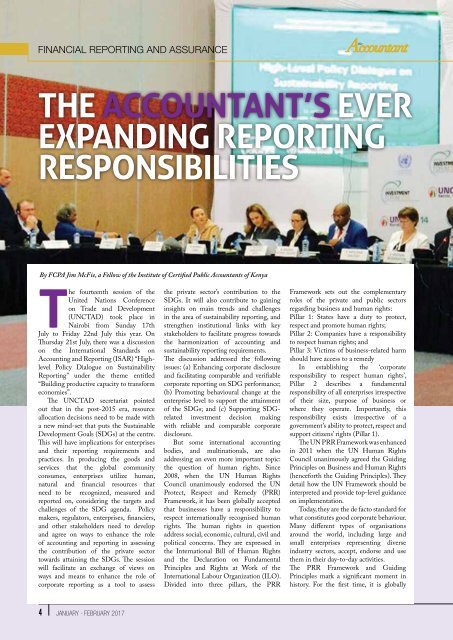The Accountant-Jan-Feb 2017
Create successful ePaper yourself
Turn your PDF publications into a flip-book with our unique Google optimized e-Paper software.
Financial reporting and assurance<br />
THE ACCOUNTANT’S EVER<br />
EXPANDING REPORTING<br />
RESPONSIBILITIES<br />
By FCPA Jim McFie, a Fellow of the Institute of Certified Public <strong>Accountant</strong>s of Kenya<br />
<strong>The</strong> fourteenth session of the<br />
United Nations Conference<br />
on Trade and Development<br />
(UNCTAD) took place in<br />
Nairobi from Sunday 17th<br />
July to Friday 22nd July this year. On<br />
Thursday 21st July, there was a discussion<br />
on the International Standards on<br />
Accounting and Reporting (ISAR) “Highlevel<br />
Policy Dialogue on Sustainability<br />
Reporting” under the theme entitled<br />
“Building productive capacity to transform<br />
economies”.<br />
<strong>The</strong> UNCTAD secretariat pointed<br />
out that in the post-2015 era, resource<br />
allocation decisions need to be made with<br />
a new mind-set that puts the Sustainable<br />
Development Goals (SDGs) at the centre.<br />
This will have implications for enterprises<br />
and their reporting requirements and<br />
practices. In producing the goods and<br />
services that the global community<br />
consumes, enterprises utilize human,<br />
natural and financial resources that<br />
need to be recognized, measured and<br />
reported on, considering the targets and<br />
challenges of the SDG agenda. Policy<br />
makers, regulators, enterprises, financiers,<br />
and other stakeholders need to develop<br />
and agree on ways to enhance the role<br />
of accounting and reporting in assessing<br />
the contribution of the private sector<br />
towards attaining the SDGs. <strong>The</strong> session<br />
will facilitate an exchange of views on<br />
ways and means to enhance the role of<br />
corporate reporting as a tool to assess<br />
the private sector’s contribution to the<br />
SDGs. It will also contribute to gaining<br />
insights on main trends and challenges<br />
in the area of sustainability reporting, and<br />
strengthen institutional links with key<br />
stakeholders to facilitate progress towards<br />
the harmonization of accounting and<br />
sustainability reporting requirements.<br />
<strong>The</strong> discussion addressed the following<br />
issues: (a) Enhancing corporate disclosure<br />
and facilitating comparable and verifiable<br />
corporate reporting on SDG performance;<br />
(b) Promoting behavioural change at the<br />
enterprise level to support the attainment<br />
of the SDGs; and (c) Supporting SDGrelated<br />
investment decision making<br />
with reliable and comparable corporate<br />
disclosure.<br />
But some international accounting<br />
bodies, and multinationals, are also<br />
addressing an even more important topic:<br />
the question of human rights. Since<br />
2008, when the UN Human Rights<br />
Council unanimously endorsed the UN<br />
Protect, Respect and Remedy (PRR)<br />
Framework, it has been globally accepted<br />
that businesses have a responsibility to<br />
respect internationally recognised human<br />
rights. <strong>The</strong> human rights in question<br />
address social, economic, cultural, civil and<br />
political concerns. <strong>The</strong>y are expressed in<br />
the International Bill of Human Rights<br />
and the Declaration on Fundamental<br />
Principles and Rights at Work of the<br />
International Labour Organization (ILO).<br />
Divided into three pillars, the PRR<br />
Framework sets out the complementary<br />
roles of the private and public sectors<br />
regarding business and human rights:<br />
Pillar 1: States have a duty to protect,<br />
respect and promote human rights;<br />
Pillar 2: Companies have a responsibility<br />
to respect human rights; and<br />
Pillar 3: Victims of business-related harm<br />
should have access to a remedy<br />
In establishing the ‘corporate<br />
responsibility to respect human rights’,<br />
Pillar 2 describes a fundamental<br />
responsibility of all enterprises irrespective<br />
of their size, purpose of business or<br />
where they operate. Importantly, this<br />
responsibility exists irrespective of a<br />
government’s ability to protect, respect and<br />
support citizens’ rights (Pillar 1).<br />
<strong>The</strong> UN PRR Framework was enhanced<br />
in 2011 when the UN Human Rights<br />
Council unanimously agreed the Guiding<br />
Principles on Business and Human Rights<br />
(henceforth the Guiding Principles). <strong>The</strong>y<br />
detail how the UN Framework should be<br />
interpreted and provide top-level guidance<br />
on implementation.<br />
Today, they are the de facto standard for<br />
what constitutes good corporate behaviour.<br />
Many different types of organisations<br />
around the world, including large and<br />
small enterprises representing diverse<br />
industry sectors, accept, endorse and use<br />
them in their day-to-day activities.<br />
<strong>The</strong> PRR Framework and Guiding<br />
Principles mark a significant moment in<br />
history. For the first time, it is globally<br />
4 JANUARY - FEBRUARY <strong>2017</strong>

















